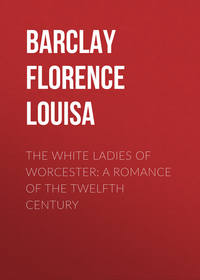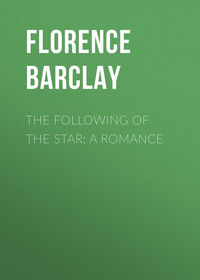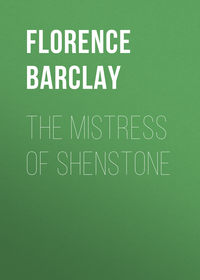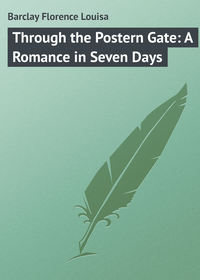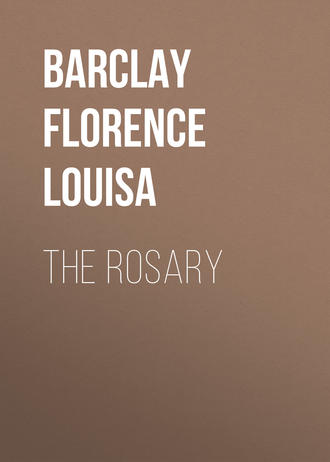 полная версия
полная версияThe Rosary
"Not at all," said Nurse Rosemary, politely; "but I want you to have some breakfast; and the letters will be here in a few minutes."
He looked so brown and radiant, this dear delightful boy, with his gold-brown tie, and yellow rose. She was conscious of her pallor, and oppressive earnestness, as she said: "The letters will be here."
"Oh, bother the letters!" cried Garth. "Let's have a holiday from letters on May Day! You shall be Queen of the May; and Margery shall be the old mother. I will be Robin, with the breaking heart, leaning on the bridge beneath the hazel tree; and Simpson can be the 'bolder lad.' And we will all go and 'gather knots of flowers, and buds, and garlands gay.'"
"Mr. Dalmain," said Nurse Rosemary, laughing, in spite of herself, "you really must be sensible, or I shall go and consult Margery. I have never seen you in such a mood."
"You have never seen me, on a day when something was going to happen," said Garth; and Nurse Rosemary made no further attempt to repress him.
After breakfast, he went to the piano, and played two-steps, and rag-time music, so infectiously, that Simpson literally tripped as he cleared the table; and Nurse Rosemary, sitting pale and preoccupied, with a pile of letters before her, had hard work to keep her feet still.
Simpson had two-stepped to the door with the cloth, and closed it after him. Nurse Rosemary's remarks about the post-bag, and the letters, had remained unanswered. "Shine little glowworm glimmer" was pealing gaily through the room, like silver bells,—when the door opened, and old Margery appeared, in a black satin apron, and a blue print sunbonnet. She came straight to the piano, and laid her hand gently on Garth's arm.
"Master Garthie," she said, "on this lovely May morning, will you take old Margery up into the woods?"
Garth's hands dropped from the keys. "Of course I will, Margie," he said. "And, I say Margie, SOMETHING IS GOING TO HAPPEN."
"I know it, laddie," said the old woman, tenderly; and the expression with which she looked into the blind face filled Jane's eyes with tears. "I woke with it too, Master Garthie; and now we will go into the woods, and listen to the earth, and trees, and flowers, and they will tell us whether it is for joy, or for sorrow. Come, my own laddie."
Garth rose, as in a dream. Even in his blindness he looked so young, and so beautiful, that Jane's watching heart stood still.
At the window he paused. "Where is that secretary person?" he said, vaguely. "She kept trying to shut me up."
"I know she did, laddie," said old Margery, curtseying apologetically towards Jane. "You see she does not know the 'something-is-going-to-happen-to-day' awakening."
"Ah, doesn't she?" thought Jane, as they disappeared through the window. "But as my Garth has gone off his dear head, and been taken away by his nurse, the thing that is going to happen, can't happen just yet." And Jane sat down to the piano, and very softly ran through the accompaniment of The Rosary. Then,—after shading her eyes on the terrace, and making sure that a tall white figure leaning on a short dark one, had almost reached the top of the hill,—still more softly, she sang it.
Afterwards she went for a tramp on the moors, and steadied her nerve by the rapid swing of her walk, and the deep inbreathing of that glorious air. Once or twice she took a telegram from her pocket, stood still and read it; then tramped on, to the wonder of the words: "Special license easily obtained." Ah, the license might be easy to obtain; but how about his forgiveness? That must be obtained first. If there were only this darling boy to deal with, in his white flannels and yellow roses, with a May-Day madness in his veins, the license might come at once; and all he could wish should happen without delay. But this is a passing phase of Garth. What she has to deal with is the white-faced man, who calmly said: "I accept the cross," and walked down the village church leaving her—for all these years. Loving her, as he loved her; and yet leaving her,—without word or sign, for three long years. To hire, was the confession; his would be the decision; and, somehow, it did not surprise her, when she came down to luncheon, a little late, to find HIM seated at the table.
"Miss Gray," he said gravely, as he heard her enter, "I must apologise for my behaviour this morning. I was what they call up here 'fey.' Margery understands the mood; and together she and I have listened to kind Mother Earth, laying our hands on her sympathetic softness, and she has told us her secrets. Then I lay down under the fir trees and slept; and awakened calm and sane, and ready for what to-day must bring. For it WILL bring something. That is no delusion. It is a day of great things. That much, Margery knows, too."
"Perhaps," suggested Nurse Rosemary, tentatively, "there may be news of interest in your letters."
"Ah," said Garth, "I forgot. We have not even opened this morning's letters. Let us take time for them immediately after lunch. Are there many?"
"Quite a pile," said Nurse Rosemary.
"Good. We will work soberly through them."
Half an hour later Garth was seated in his chair, calm and expectant; his face turned towards his secretary. He had handled his letters, and amongst them he had found one sealed; and the seal was a plumed helmet, with visor closed. Nurse Rosemary saw him pale, as his fingers touched it. He made no remark; but, as before, slipped it beneath the rest, that it might come up for reading, last of all.
When the others were finished, and Nurse Rosemary took up this letter, the room was very still. They were quite alone. Bees hummed in the garden. The scent of flowers stole in at the window. But no one disturbed their solitude.
Nurse Rosemary took up the envelope.
"Mr. Dalmain, here is a letter, sealed with scarlet wax. The seal is a helmet with visor—"
"I know," said Garth. "You need not describe it further. Kindly open it."
Nurse Rosemary opened it. "It is a very long letter, Mr. Dalmain."
"Indeed? Will you please read it to me, Miss Gray."
A tense moment of silence followed. Nurse Rosemary lifted the letter; but her voice suddenly refused to respond to her will. Garth waited without further word.
Then Nurse Rosemary said: "Indeed, sir, it seems a most private letter. I find it difficult to read it to you."
Garth heard the distress in her voice, and turned to her kindly.
"Never mind, my dear child. It in no way concerns you. It is a private letter to me; but my only means of hearing it is through your eyes, and from your lips. Besides, the lady, whose seal is a plumed helmet, can have nothing of a very private nature to say to me."
"Ah, but she has," said Nurse Rosemary, brokenly.
Garth considered this in silence.
Then: "Turn over the page," he said, "and tell me the signature."
"There are many pages," said Nurse Rosemary.
"Turn over the pages then," said Garth, sternly. "Do not keep me waiting. How is that letter signed?"
"YOUR WIFE," whispered Nurse Rosemary.
There was a petrifying quality about the silence which followed. It seemed as if those two words, whispered into Garth's darkness, had turned him to stone.
At last he stretched out his hand. "Will you give me that letter, if you please, Miss Gray? Thank you. I wish to be alone for a quarter of an hour. I shall be glad if you will be good enough to sit in the dining-room, and stop any one from coming into this room. I must be undisturbed. At the end of that time kindly return."
He spoke so quietly that Jane's heart sank within her. Some display of agitation would have been reassuring. This was the man who, bowing his dark head towards the crucifixion window, said: "I accept the cross." This was the man, whose footsteps never once faltered as he strode down the aisle, and left her. This was the man, who had had the strength, ever since, to treat that episode between her and himself, as completely closed; no word of entreaty; no sign of remembrance; no hint of reproach. And this was the man to whom she had signed herself: "Your wife."
In her whole life, Jane had never known fear. She knew it now.
As she silently rose and left him, she stole one look at his face. He was sitting perfectly still; the letter in his hand. He had not turned his head toward her as he took it. His profile might have been a beautiful carving in white ivory. There was not the faintest tinge of colour in his face; just that ivory pallor, against the ebony lines of his straight brows, and smooth dark hair.
Jane softly left the room, closing the door behind her.
Then followed the longest fifteen minutes she had ever known. She realised what a tremendous conflict was in progress in that quiet room. Garth was arriving at his decision without having heard any of her arguments. By the strange fatality of his own insistence, he had heard only two words of her letter, and those the crucial words; the two words to which the whole letter carefully led up. They must have revealed to him instantly, what the character of the letter would be; and what was the attitude of mind towards himself, of the woman who wrote them.
Jane paced the dining-room in desperation, remembering the hours of thought which had gone to the compiling of sentences, cautiously preparing his mind to the revelation of the signature.
Suddenly, in the midst of her mental perturbation, there came to her the remembrance of a conversation between Nurse Rosemary and Garth over the pictures. The former had said: "Is she a wife?" And Garth had answered: "Yes." Jane had instantly understood what that answer revealed and implied. Because Garth had so felt her his during those wonderful moments on the terrace at Shenstone, that he could look up into her face and say, "My wife"—not as an interrogation, but as an absolute statement of fact,—he still held her this, as indissolubly as if priest, and book, and ring, had gone to the wedding of their union. To him, the union of souls came before all else; and if that had taken place, all that might follow was but the outward indorsement of an accomplished fact. Owing to her fear, mistrust, and deception, nothing had followed. Their lives had been sundered; they had gone different ways. He regarded himself as being no more to her than any other man of her acquaintance. During these years he had believed, that her part in that evening's wedding of souls had existed in his imagination, only; and had no binding effect upon her. But his remained. Because those words were true to him then, he had said them; and, because he had said them, he would consider her his wife, through life,—and after. It was the intuitive understanding of this, which had emboldened Jane so to sign her letter. But how would he reconcile that signature with the view of her conduct which he had all along taken, without ever having the slightest conception that there could be any other?
Then Jane remembered, with comfort, the irresistible appeal made by Truth to the soul of the artist; truth of line; truth of colour; truth of values; and, in the realm of sound, truth of tone, of harmony, of rendering, of conception. And when Nurse Rosemary had said of his painting of "The Wife": "It is a triumph of art"; Garth had replied: "It is a triumph of truth." And Jane's own verdict on the look he had seen and depicted was: "It is true—yes, it is true!" Will he not realise now the truth of that signature; and, if he realises it, will he not be glad in his loneliness, that his wife should come to him; unless the confessions and admissions of the letter cause him to put her away as wholly unworthy?
Suddenly Jane understood the immense advantage of the fact that he would hear every word of the rest of her letter, knowing the conclusion, which she herself could not possibly have put first. She saw a Higher Hand in this arrangement; and said, as she watched the minutes slowly pass: "He hath broken down the middle wall of partition between us"; and a sense of calm assurance descended, and garrisoned her soul with peace.
The quarter of an hour was over.
Jane crossed the hall with firm, though noiseless, step; stood a moment on the threshold relegating herself completely to the background; then opened the door; and Nurse Rosemary re-entered the library.
CHAPTER XXXIV
"LOVE NEVER FAILETH"
Garth was standing at the open window, when Nurse Rosemary re-entered the library; and he did not turn, immediately.
She looked anxiously for the letter, and saw it laid ready on her side of the table. It bore signs of having been much crumpled; looking almost as a letter might appear which had been crushed into a ball, flung into the waste-paper basket, and afterwards retrieved. It had, however, been carefully smoothed out; and lay ready to her hand.
When Garth turned from the window and passed to his chair, his face bore the signs of a great struggle. He looked as one who, sightless, has yet been making frantic efforts to see. The ivory pallor was gone. His face was flushed; and his thick hair, which grew in beautiful curves low upon his forehead and temples, and was usually carefully brushed back in short-cropped neatness, was now ruffled and disordered. But his voice was completely under control, as he turned towards his secretary.
"My dear Miss Gray," he said, "we have a difficult task before us. I have received a letter, which it is essential I should hear. I am obliged to ask you to read it to me, because there is absolutely no one else to whom I can prefer such a request. I cannot but know that it will be a difficult and painful task for you, feeling yourself an intermediary between two wounded and sundered hearts. May I make it easier, my dear little girl, by assuring you that I know of no one in this world from whose lips I could listen to the contents of that letter with less pain; and, failing my own, there are no eyes beneath which I could less grudgingly let it pass, there is no mind I could so unquestioningly trust, to judge kindly, both of myself and of the writer; and to forget faithfully, all which was not intended to come within the knowledge of a third person."
"Thank you, Mr. Dalmain," said Nurse Rosemary.
Garth leaned back in his chair, shielding his face with his hand.
"Now, if you please," he said. And, very clearly and quietly, Nurse Rosemary began to read.
"DEAR GARTH, As you will not let me come to you, so that I could say, between you and me alone, that which must be said, I am compelled to write it. It is your own fault, Dal; and we both pay the penalty. For how can I write to you freely when I know, that as you listen, it will seem to you of every word I am writing, that I am dragging a third person into that which ought to be, most sacredly, between you and me alone. And yet, I must write freely; and I must make you fully understand; because the whole of your future life and mine will depend upon your reply to this letter. I must write as if you were able to hold the letter in your own hands, and read it to yourself. Therefore, if you cannot completely trust your secretary, with the private history of your heart and mine, bid her give it you back without turning this first page; and let me come myself, Garth, and tell you all the rest."
"That is the bottom of the page," said Nurse Rosemary; and waited.
Garth did not remove his hand. "I do completely trust; and she must not come," he said.
Nurse Rosemary turned the page, and went on reading.
"I want you to remember, Garth, that every word I write, is the simple unvarnished truth. If you look back over your remembrance of me, you will admit that I am not naturally an untruthful person, nor did I ever take easily to prevarication. But, Garth, I told you one lie; and that fatal exception proves the rule of perfect truthfulness, which has always otherwise held, between you and me; and, please God, always will hold. The confession herein contained, concerns that one lie; and I need not ask you to realise how humbling it is to my pride to have to force the hearing of a confession upon the man who has already refused to admit me to a visit of friendship. You will remember that I am not naturally humble; and have a considerable amount of proper pride; and, perhaps, by the greatness of the effort I have had to make, you will be able to gauge the greatness of my love. God help you to do so—my darling; my beloved; my poor desolate boy!"
Nurse Rosemary stopped abruptly; for, at this sudden mention of love, and at these words of unexpected tenderness from Jane, Garth had risen to his feet, and taken two steps towards the window; as if to escape from something too immense to be faced. But, in a moment he recovered himself, and sat down again, completely hiding his face with his hand.
Nurse Rosemary resumed the reading of the letter.
"Ah, what a wrong I have done, both to you, and to myself! Dear, you remember the evening on the terrace at Shenstone, when you asked me to be—when you called me—when I WAS—YOUR WIFE? Garth, I leave this last sentence as it stands, with its two attempts to reach the truth. I will not cross them out, but leave them to be read to you; for, you see Garth, I finally arrived! I WAS your wife. I did not understand it then. I was intensely surprised; unbelievably inexperienced in matters of feeling; and bewildered by the flood of sensation which swept me off my feet and almost engulfed me. But even then I knew that my soul arose and proclaimed you mate and master. And when you held me, and your dear head lay upon my heart, I knew, for the first time the meaning of the word ecstasy; and I could have asked no kinder gift of heaven, than to prolong those moments into hours."
Nurse Rosemary's quiet voice broke, suddenly; and the reading ceased.
Garth was leaning forward, his head buried in his hands. A dry sob rose in his throat, just at the very moment when Nurse Rosemary's voice gave way.
Garth recovered first. Without lifting his head, with a gesture of protective affection and sympathy, he stretched his hand across the table.
"Poor little girl," he said, "I am so sorry. It is rough on you. If only it had come when Brand was here! I am afraid you MUST go on; but try to read without realising. Leave the realising to me."
And Nurse Rosemary read on.
"When you lifted your head in the moonlight and gazed long and earnestly at me—Ah, those dear eyes!—your look suddenly made me self-conscious. There swept over me a sense of my own exceeding plainness, and of how little there was in what those dear eyes saw, to provide reason, for that adoring look. Overwhelmed with a shy shame I pressed your head back to the place where the eyes would be hidden; and I realise now what a different construction you must have put upon that action. Garth, I assure you, that when you lifted your head the second time, and said, 'My wife,' it was the first suggestion to my mind that this wonderful thing which was happening meant—marriage. I know it must seem almost incredible, and more like a child of eighteen, than a woman of thirty. But you must remember, all my dealings with men up to that hour had been handshakes, heartiest comradeship, and an occasional clap on the shoulder given and received. And don't forget, dear King of my heart, that, until one short week before, you had been amongst the boys who called me 'good old Jane,' and addressed me in intimate conversation as 'my dear fellow'! Don't forget that I had always looked upon you as YEARS younger than myself; and though a strangely sweet tie had grown up between us, since the evening of the concert at Overdene, I had never realised it as love. Well—you will remember how I asked for twelve hours to consider my answer; and you yielded, immediately; (you were so perfect, all the time, Garth) and left me, when I asked to be alone; left me, with a gesture I have never forgotten. It was a revelation of the way in which the love of a man such as you exalts the woman upon whom it is outpoured. The hem of that gown has been a sacred thing to me, ever since. It is always with me, though I never wear it.—A detailed account of the hours which followed, I shall hope to give you some day, my dearest. I cannot write it. Let me hurl on to paper, in all its crude ugliness, the miserable fact which parted us; turning our dawning joy to disillusion and sadness. Garth—it was this. I did not believe your love would stand the test of my plainness. I knew what a worshipper of beauty you were; how you must have it, in one form or another, always around you. I got out my diary in which I had recorded verbatim our conversation about the ugly preacher, whose face became illumined into beauty, by the inspired glory within. And you added that you never thought him ugly again; but he would always be plain. And you said it was not the sort of face one would want to have always before one at meals; but that you were not called upon to undergo that discipline, which would be sheer martyrdom to you."
"I was so interested, at the time; and so amused at the unconscious way in which you stood and explained this, to quite the plainest woman of your acquaintance, that I recorded it very fully in my journal.—Alas! On that important night, I read the words, over and over, until they took morbid hold upon my brain. Then—such is the self-consciousness awakened in a woman by the fact that she is loved and sought—I turned on all the lights around my mirror, and critically and carefully examined the face you would have to see every day behind your coffee-pot at breakfast, for years and years, if I said 'Yes,' on the morrow. Darling, I did not see myself through your eyes, as, thank God, I have done since. And I DID NOT TRUST YOUR LOVE TO STAND THE TEST. It seemed to me, I was saving both of us from future disappointment and misery, by bravely putting away present joy, in order to avoid certain disenchantment. My beloved, it will seem to you so coolly calculating, and so mean; so unworthy of the great love you were even then lavishing upon me. But remember, for years, your remarkable personal grace and beauty had been a source of pleasure to me; and I had pictured you wedded to Pauline Lister, for instance, in her dazzling whiteness, and soft radiant youth. So my morbid self-consciousness said: 'What! This young Apollo, tied to my ponderous plainness; growing handsomer every year, while I grow older and plainer?' Ah, darling! It sounds so unworthy, now we know what our love is. But it sounded sensible and right that night; and at last, with a bosom that ached, and arms that hung heavy at the thought of being emptied of all that joy, I made up my mind to say 'no.' Ah, believe me, I had no idea what it already meant to you. I thought you would pass on at once to another fancy; and transfer your love to one more able to meet your needs, at every point. Honestly, Garth, I thought I should be the only one left desolate.—Then came the question: how to refuse you. I knew if I gave the true reason, you would argue it away, and prove me wrong, with glowing words, before which I should perforce yield. So—as I really meant not to let you run the risk, and not to run it myself—I lied to you, my beloved. To you, whom my whole being acclaimed King of my heart, Master of my will; supreme to me, in love and life,—to YOU I said: 'I cannot marry a mere boy.' Ah, darling! I do not excuse it. I do not defend it. I merely confess it; trusting to your generosity to admit, that no other answer would have sent you away. Ah, your poor Jane, left desolate! If you could have seen her in the little church, calling you back; retracting and promising; listening for your returning footsteps, in an agony of longing. But my Garth is not made of the stuff which stands waiting on the door-mat of a woman's indecision."
"The lonely year which followed so broke my nerve, that Deryck Brand told me I was going all to pieces, and ordered me abroad. I went, as you know; and in other, and more vigorous, surroundings, there came to me a saner view of life. In Egypt last March, on the summit of the Great Pyramid, I made up my mind that I could live without you no longer. I did not see myself wrong; but I yearned so for your love, and to pour mine upon you, my beloved, that I concluded it was worth the risk. I made up my mind to take the next boat home, and send for you. Then—oh, my own boy—I heard. I wrote to you; and you would not let me come."
"Now I know perfectly well, that you might say: 'She did not trust me when I had my sight. Now that I cannot see, she is no longer afraid.' Garth, you might, say that; but it would not be true. I have had ample proof lately that I was wrong, and ought to have trusted you all through. What it is, I will tell you later. All I can say now is: that, if your dear shining eyes could see, they would see, NOW, a woman who is, trustfully and unquestioningly, all your own. If she is doubtful of her face and figure, she says quite simply: 'They pleased HIM; and they are just HIS. I have no further right to criticise them. If he wants them, they are not mine, but his.' Darling, I cannot tell you now, how I have arrived at this assurance. But I have had proofs beyond words of your faithfulness and love."


